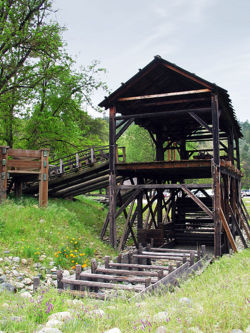- Ausonius
-
This article is about the Roman poet. For the Swedish murderer, see John Ausonius.
 Monument to Ausonius in Milan.
Monument to Ausonius in Milan.
Decimius Magnus Ausonius (ca. 310–395) was a Latin poet and rhetorician, born at Burdigala (Bordeaux).
Contents
Biography
Decimius Magnus Ausonius was born in Bordeaux in ca. 310. His father was a noted physician of Greek ancestry[1][2] and his mother was descended on both sides from long-established aristocratic Gallo-Roman families of southwestern Gaul.[2] Ausonius was given a strict upbringing by his aunt and grandmother, both named Aemilia. He received an excellent education, especially in grammar and rhetoric, but professed that his progress in Greek was unsatisfactory. Having completed his studies, he trained for some time as an advocate, but he preferred teaching. In 334, he established a school of rhetoric in Bordeaux, which was very popular. His most famous pupil was St. Paulinus of Nola, who later became Bishop of Nola.
After thirty years of this work, he was summoned by Valentinian to the imperial court to teach Gratian, the heir-apparent. The prince greatly respected his tutor, and after his accession bestowed on him the highest titles and honours that any Roman (besides from the royal family) could attain, culminating in the consulate in 379. Ausonius also took part in a military campaign against the Alamanni, in 375, and then later he received the Alamanni slave girl Bissula as his part of the booty; he later addressed a poem to her.
After the murder of Gratian in 383, Ausonius retired to his estates near Burdigala (now Bordeaux) in Gaul. These supposedly included the land now owned by Château Ausone, which takes its name from him. He appears to have been a late and perhaps not very enthusiastic convert to Christianity. He died about 395.
Works
- Epigramata de diversis rebus. About 120 epigrams on various topics.
- Ephemeris. A description of the occupations of the day from morning till evening, in various meters, composed before 367. Only the beginning and end are preserved.
- Parentalia. 30 poems of various lengths, mostly in elegiac meter, on deceased relations, composed after his consulate, when he had already been a widower for 36 years.
- Commemoratio professorum Burdigalensium or Professores. A continuation of the Parentalia, dealing with the famous teachers of his native Bourdeaux whom he had known.
- Epitaphia. 26 epitaphs of heroes from the Trojan war, translated from Greek
- Caesares. On the 12 emperors described by Suetonius.
- Ordo urbium nobilium. 14 pieces, dealing with 17 towns (Rome to Burdigala), in hexameters, and composed after the downfall of Maximus in 388.
- Ludus VII Sapientium.[3] A kind of puppet play in which the seven wise men appear successively and have their say.
- The so-called Idyllia. 20 pieces are grouped under this arbitrary title, the most famous of which is the
- Mosella.[4] It also includes
- Griphus ternarii numeri
- De aetatibus Hesiodon
- Monosticha de aerumnis Herculis
- De ambiguitate eligendae vitae
- De viro bono
- EST et NON
- De rosis nascentibus (dubious)
- Versus paschales
- Epicedion in patrem
- Technopaegnion
- Cento nuptialis, composed of lines and half-lines of Vergil.
- Bissula
- Protrepticus
- Genethliacon
- Eglogarum liber. A collection of all kinds of astronomical and astrological versifications in epic and elegiac meter.
- Epistolarum liber. 25 verse letters in various meters.
- Ad Gratianum gratiarum actio pro consulatu. Speech of thanks to the emperor Gratian on the occasion of attaining the consulship, delivered at Treves in 379.
- Periochae Homeri Iliadis et Odyssiae. A prose summary of Homer's Iliad and Odyssey, attributed to but probably not written by Ausonius.
- Praefatiunculae. Prefaces by the poet to various collections of his poems, including a response to the emperor Theodosius I's request for his poems.
Although much admired by his contemporaries, the writings of Ausonius have not since been ranked among Latin literature's finest. His style is easy and fluent, and his Mosella is still widely appreciated for its description of life and scenery along the River Moselle. Overall, however, he is generally considered derivative and unoriginal. Edward Gibbon observed in the third volume of his Decline and Fall of the Roman Empire that "the poetical fame of Ausonius condemns the taste of his age." However, he is frequently cited by historians of winemaking, as his works give early evidence of large-scale viniculture in the now-famous wine country around his native Bordeaux.
His contribution to the carpe diem topic is also widely known and acclaimed:
Collige, virgo, rosas, dum flos novus et nova pubes / et memor esto aevum sic properare tuum.—Epigrammata: «Rosae» 2:49Pick, girl, the flowers while they are still fresh and the youth is new, remembering that the time goes by.An interesting little work of his is the Cento Nuptialis, translated as A Nuptial Cento by H.G. Evelyn-White for Loeb Classical Library. Composed entirely of quotations from Virgil, the poem celebrates a wedding culminating in a defloration of great virtuosity and obscenity:
- Itque reditque viam totiens | uteroque recusso
- transadigit costas | et pectine pulsat eburno.
- Iamque fere spatio extremo fessique sub ipsam
- finem adventabant: | tum creber anhelitus artus
- aridaque ora quatit, sudor fluit undique rivis,
- labitur exsanguis, | destillat ab inguine virus.
- Back and forth he plies his path and, the cavity reverberating,
- thrusts between the bones, and strikes with ivory quill.
- And now, their journey covered, wearily they neared
- their very goal: then rapid breathing shakes his limbs
- and parched mouth, his sweat in rivers flows;
- down he slumps bloodless; the fluid drips from his groin.
Saw mill
 Scheme of a water-driven Roman sawmill at Hierapolis, Asia Minor. The 3rd century mill is the earliest known machine to incorporate a crank and connecting rod mechanism.[5]
Scheme of a water-driven Roman sawmill at Hierapolis, Asia Minor. The 3rd century mill is the earliest known machine to incorporate a crank and connecting rod mechanism.[5]
His writings are also remarkable for mentioning, in passing, the working of a water mill sawing marble on a tributary of the Moselle:
....renowned is Celbis for glorious fish, and that other, as he turns his mill-stones in furious revolutions and drives the shrieking saws through smooth blocks of marble, hears from either bank a ceaseless din...
The excerpt sheds new light on the development of Roman technology in using water power for different applications. It is one of the rare references in Roman literature of water mills used to cut stone, but is a logical consequence of the application of water power to mechanical sawing of stone (and presumably wood also). Earlier references to the widespread use of mills occur in Vitruvius in his De Architectura of circa 25 BC, and the Naturalis Historia of Pliny the Elder published in 77 AD. Such applications of mills were to multiply again after the fall of the Empire through the Dark Ages into the modern era. The mills at Barbegal in southern France are famous for their application of water power to grinding grain to make flour and were built in the 1st century AD. They consisted of 16 mills in a parallel sequence on a hill near Arles.
The construction of a saw mill is even simpler than a flour or grinding mill, since no gearing is needed, and the rotary saw blade can be driven direct from the water wheel axle, as the example of Sutter's Mill in California shows. However, a different mechanism is shown by the sawmill at Hieropolis involving a frame saw operated through a crank and connecting rod.
Further reading
- Altay Coskun: Die gens Ausoniana an der Macht. Untersuchungen zu Decimius Magnus Ausonius und seiner Familie. Prosopographica et Genealogica 8. Oxford 2002, ISBN 1-900934-07-8.
- John R. Martindale: Decimius Magnus Ausonius. In: The Prosopography of the Later Roman Empire. Vol I, Cambridge 1971, S. 140f.
- Hagith Sivan: Ausonius of Bordeaux: Genesis of a Gallic Aristocracy,Routledge,1993
- Ausone de Bordeaux, Opuscula Omnia, Œuvres complètes, edited by Bernard Combeaud, book, 870 p. or CD-Rom, Mollat, 2010.
See also
- Ausones, Ausonia
- Château Ausone
- French wine
- List of wine personalities
- Roman aqueducts
- Roman engineering
- Roman technology
- watermills
- Aemilius Magnus Arborius
References
 This article incorporates text from a publication now in the public domain: Chisholm, Hugh, ed (1911). Encyclopædia Britannica (11th ed.). Cambridge University Press.
This article incorporates text from a publication now in the public domain: Chisholm, Hugh, ed (1911). Encyclopædia Britannica (11th ed.). Cambridge University Press.
External links
- Works by Ausonius at the Internet Archive
- Latin text of Mosella and the Septem Sententiae
- Ausonius' Opera Omnia: IntraText Digital Library
- Opera Omnia by Migne Patrologia Latina
- wiki text and translation of Moselle
- Wikipedia France: Ausone, vie et travaux
Notes
Political offices Preceded by
Valens,
Valentinian IIConsul of the Roman Empire
379
with Quintus Clodius Hermogenianus OlybriusSucceeded by
Gratian,
Theodosius ICategories:- 310 births
- 395 deaths
- People from Bordeaux
- Roman-era Greeks
- Roman era poets
- Late Antique Latin-language writers
- Ancient Roman rhetoricians
- Imperial Roman consuls
- 4th-century poets
- 4th-century Romans
- Roman Gaul
Wikimedia Foundation. 2010.

